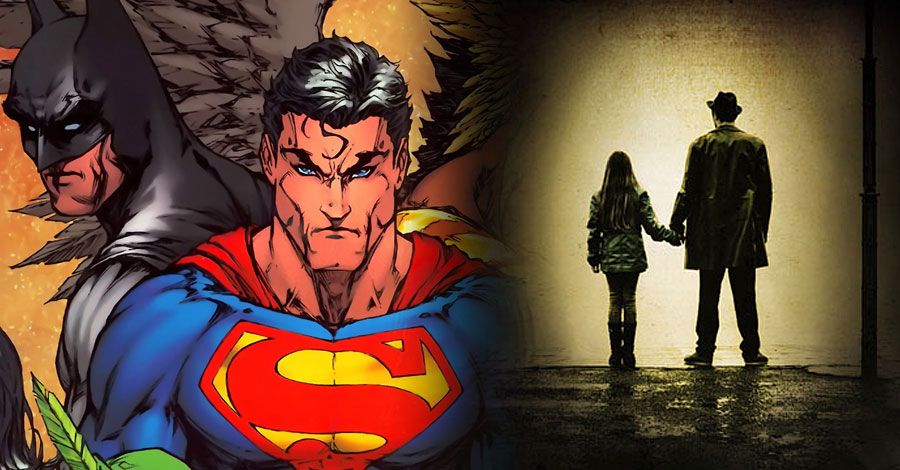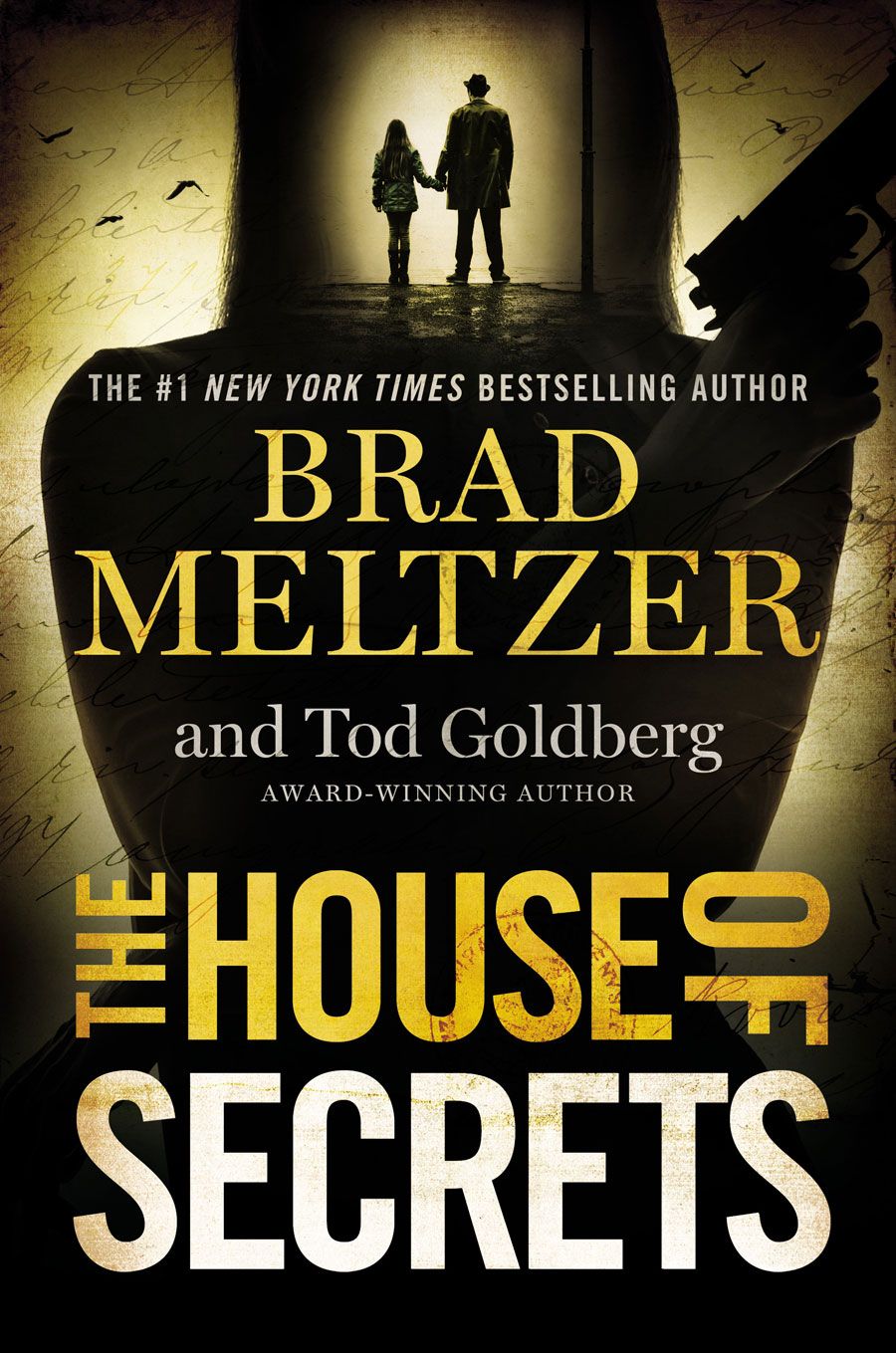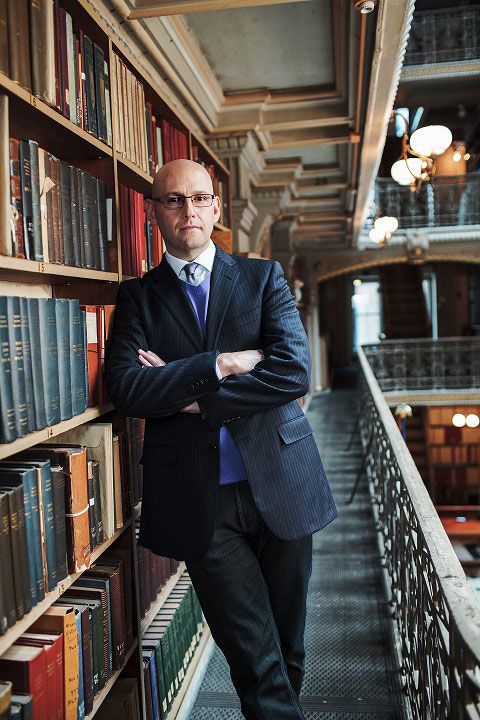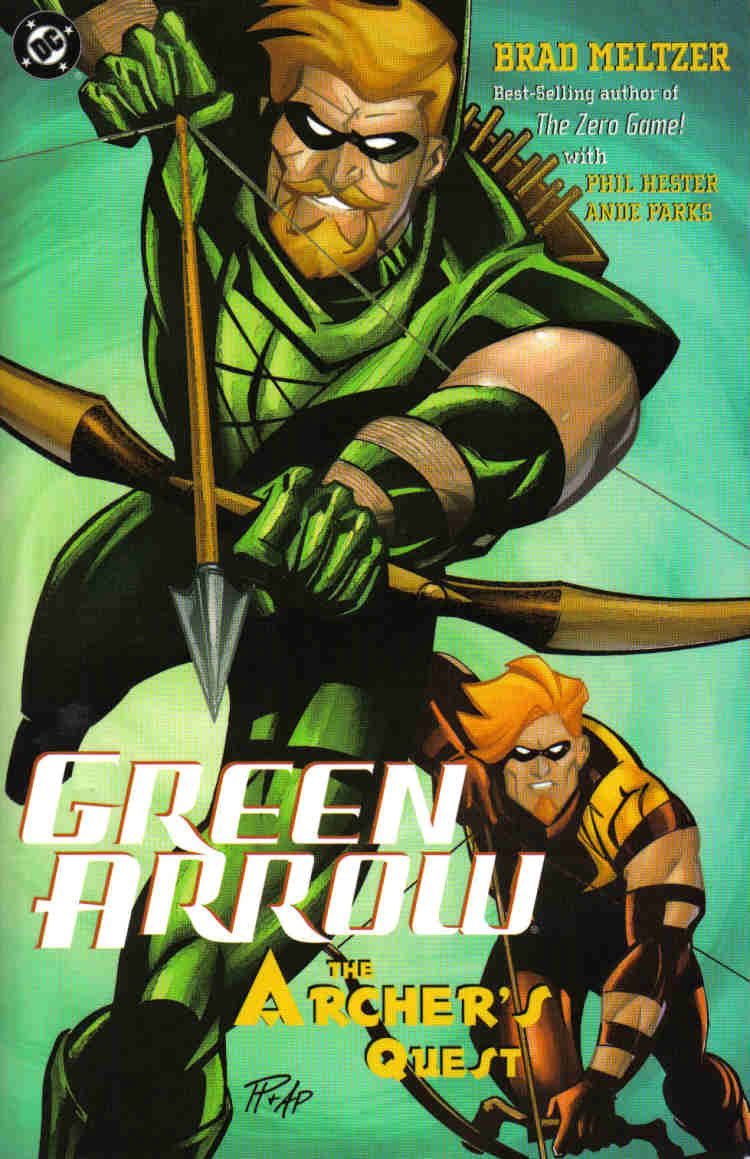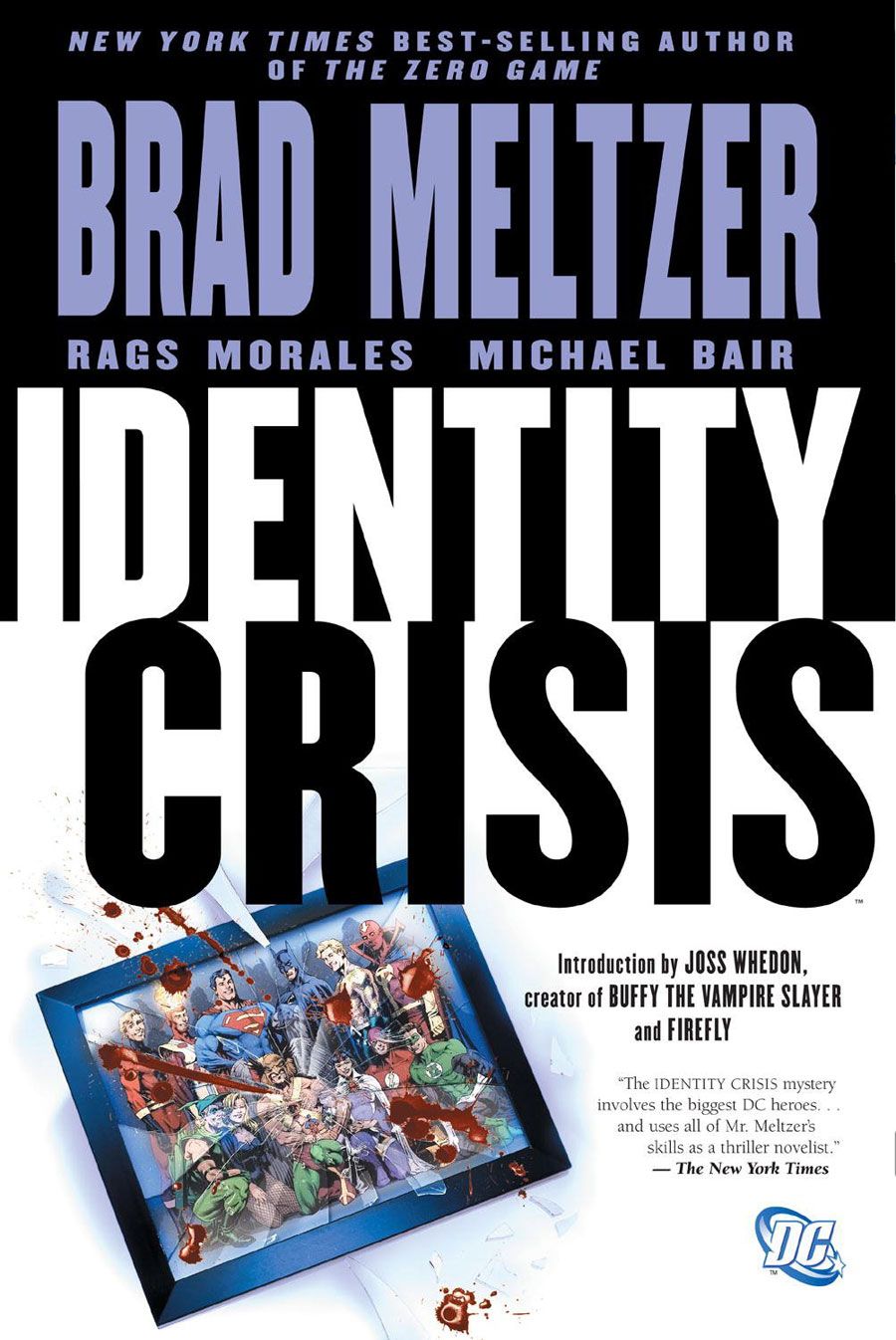Brad Meltzer has never been shy about dropping comic book references into his best-selling thriller novels. But for his most recent book, the writer put DC Comics history right on the cover.
Out this week is "The House of Secrets," a new novel written by Meltzer with Tod Goldberg that stakes new ground in the novelist's run of political-based suspense stories. This time out, Meltzer takes a page from his own life as TV host of History's "Decoded" by spinning a story of the daughter of a conspiracy cable show host who gets caught up in her own mystery plot. Aside from pulling the title directly from the classic DC Comics horror series, the author said this book is his most meta novel ever, as it plays with both his own personal history, and the building blocks of the thriller genre.
In a wide-ranging discussion with CBR News, the writer opens up on how he had to get self critical to make "The House of Secrets" work, why he's better at universe-building now than he's ever been, whether he'll ever make it to superhero TV and what the legacy of his breakout superhero mystery "Identity Crisis" will be in the wake of a more hopeful DC Universe post-Rebirth.
CBR News: When I first heard that your new book spins its plot around a TV show host who has access to high level government intrigue, my first thought was of that guy who hosted "The Gong Show" and thought he was a CIA spy. But this is more personal than that, right?
Brad Meltzer: Yeah, it's not so much Chuck Barris as it is me. It's on a much smaller scale, of course, but as I've been researching these books over the years, I've been lucky enough to get access to Senators and U.S. Presidents and even having the Department of Homeland Security come in to help brainstorm ways that terrorists are going to try and kill us. And every time I'm in one of those situations, I think to myself, "I would make the perfect spy." I remember sitting at one point in President George H.W. Bush's living room, and I was watching TV with him. I was pretty much watching what he was watching, which is fascinating in and of itself. It's like, "Does he flip through the channels like the rest of us?" But I remember thinking that the only reason I had that access is because I write thrillers and fiction, and because I did this TV show. Because of that, people will tell me stories that they would never tell me if there was a "record" of it.
What really made the book take off for me was the idea that this was a really good way for the government to collect information. When I got the call from Homeland Security [about the terrorism exercise], I thought, "There's the proof, right there. Now I can actually do this idea because I've lived it."
It's funny, because you start from this place that's personal to you, but as with any story, you have to make your main character different from you. So in this novel, it's not the TV host-turned-spy who's the focus, but it's his daughter. To put this in comics terms, are you telling a legacy story here?
Listen, it's the thing I learned in comics. The Justice Society becomes so much more interesting once the Justice League exists. Because then there's a difference and a change. It's fine to just have a Flash, but it's so much cooler to know that there's Jay Garrick, and then Barry Allen, and then Wally and going on from there. That idea creates my favorite thing of all: instant history.
I was really determined this time, because for ten books, I hadn't done a female character. The last time I had one was in my second novel. And suddenly, I had this character in my head. Tod Goldberg, who worked on this book with me, and I just had a vision of her. What came from nothing, what was always there, was this little girl who, at six years old, sits on her dad's lap and hears bedtime stories -- but her bedtime stories are about conspiracies. Her father hosts a conspiracy TV show and tells her gruesome stories about a corpse that's found with Benedict Arnold's Bible in its chest. And where as other kids will be horrified, this little girl looks up with a smile in her eyes and says, "Tell it again." For me, that was always Hazel. The book became all about answering the question of, who is this person and how they came about.
Before I became a father myself, I probably would have just written Hazel's story from there. But thanks to comics and thanks to becoming a parent myself, I realized that when you start a story like that, it becomes a far more complex history.
The other thing that strikes me as unique about this book is that you seem to be playing with the idea of what a thriller novel is supposed to be. With a character looming over things who has obsessed over weird conspiracies for years, did it allow you to get more meta with this one?
It's super meta, and that's where Goldberg was really helpful. I can only look at myself with a certain level of a ruthless eye, but when I bring someone like Tod in, who's an award-winning literary writer, he'll look at my life ruthlessly. And his own life shows up in there too, because his own father was a TV newscaster, so he knows what it's like to have that kind of fake fame. You're not really famous, but people suddenly know you and try to do things for you. There's almost a sadness that goes along with it. There's something that's downright wonderful and pathetic about it in the same breath.
We got very meta. We took almost everything that was on "Decoded" and got to play with it. It became this brand new set of tools. I always end up opening the tool chest of the White House and of Washington DC, but I never ended up going fully into the conspiracies. I don't mean in terms of telling those stories -- I mean I've never gotten into how you actually investigate and try to prove a conspiracy. One of my favorite moments in the book is when the father says, every once in a while when you're talking about conspiracies, you come to a moment where you really have to solve one. If you don't solve it, the audience may walk away. That was such an honest and freeing moment, and it was only there because I lived that moment.
It seems pretty prescient, because increasingly we seem to be living in times where what is real and what is fiction gets blurrier every day.
[Laughs] As my agent said to me, "There is no truth anymore." And that is the core of why I tell my stories, and why I throw myself into the research of them. We all have the Library of Alexandria in our pockets on a daily basis. These phones give us infinite information, but the hardest thing to find on the Internet is truth. Go put the word "Freemason" into Google, and it'll take you pages until you find something that has a bit of truth in it.
That is why, to me, the best stories to tell are the ones that are really true on some level. When we did "Decoded," I remember at one point they wanted us to play into the fear and make people worried with some talk of, "Oh, my God, the Freemasons are going to kill us." And I said, "I'm not doing that. I have no interest in telling that story." And they said to me -- this was the very first episode -- they said, "Well, what do you want to do, Brad?" And I said, "I want to tell the truth." To their credit, they said, "Okay. Let's do that." We shifted the show, and it was less about conspiracies than it was trying to figure out what the actual truth of the matter is. And that is an endlessly fascinating question.
The other part of this book that comic fans are going to tap into is the title. At what point during the writing of this did you say to yourself, "The title of this book has to be a reference to a semi-obscure DC horror series"?
You know, in my very first novel twenty years ago, the Supreme Court justices in it were all named after the characters in "Watchmen." And nobody got it except all of us really good nerds. It was like a really tough secret then, but now that's like old hat nonsense. We've seen that a million times. Really, in each book, it's become a game of what I can sneak in there that only people like us are going to get.
With this book, I felt like if I was going to shed my skin and put everything out there -- and I really do feel like this one is me putting myself out there with Tod's help, who ruthlessly looked at me -- but if I'm going to truly shed my skin and let all the muscles and bones and everything hang out, then let's fly high with this stuff. Let's put the reference right in the title, and the people who will get the nod are going to get it. The funny thing was that they said to me, "Are you sure you want this title?" and I just said, "Yes. I'm so sure of that."
The other facet of this book that connects to comics is, while your past few novels have focused on the character Beecher White, and while he isn't the lead here, he does show up. Are you building up the "Brad Meltzer Universe"?
I mean, that question makes it seem like this is something I'm in control of. The reality is, I've been reading comics for over 30 years. That's how I just do it. It's not like I'm trying to make a Meltzer-verse and ground something out for myself. Those are just the stories I've always loved -- everything has to coexist. If you go back to my very first book, "The Tenth Justice," the bad guy's name is Rick. And if you look very closely in the second book that came out, Rick has an alias, and that alias and his fate are revealed on one page in one line. If you missed it, it happened 19 years ago, and I didn't tell anyone. But then in the book after that there was a President, and his fate was revealed in a later book. I've always had this continuity, because it's how I love my own stories as a reader. I've been building all this up for 19 years, but now people see it more because they know Beecher, and they can follow him.
And I remember when I first got hired to do "Green Arrow," a guy who was doing reporting for a comic book site at the time said, "I went back and re-read all of Meltzer's books, and I realized he writes them like comics. They're all basically 22 pages and then a cliffhanger. Then, a short chapter and a cliffhanger." And when I read that at the time, I went, "Oh, my God, is that what I do?" because I had no real control over it. It was just me putting myself out there. I was like a teenager in a car. There was no restraint and no style to it. It was just pour it in, pour it on and go fast. Aow, over the years, I've dissected what I do and tried to hone that crazy thing we call craft. But for me, comics are the Mr. Miyagi for my brain. For all these years -- for decades, truly -- I've been reading short installments and a cliffhanger. That's every comic I ever read. So of course, eventually, that's what I'm going to do.
It's funny that you mention your "Green Arrow" run, because now, years later, we have the "Arrow" TV show that's run by Greg Berlanti, who you worked with on "Jack & Bobby."
Not only Greg! Someone needs to do a story about the greatest nerdy writers room in Hollywood history. Because in that one room for "Jack & Bobby," there was me, Greg, Marc Guggenheim, Michael Green who's doing "American Gods" with Neil Gaiman -- and this was before comics had broken big. I remember Michael Green and I would have text exchanges back and forth where all we would do are lines from "Dark Knight Returns," and not the big ones like, "We must not remind them that giants walk the Earth," but more like when a random character would be muttering to himself. We would go back and forth with the most obscure lines from "Dark Knight" to see who could top the other from memory -- you couldn't use the Internet. It was just a nerd haven.
At that same time, we'd go out on the Warner Bros. lot where our building was. Jeph Loeb was working on "Smallville," and we'd go to lunch with him. Then we'd go over to see Damon Lindelof and that crew when they were working on "Lost" and "Alias" and things like that. And now, all these people have gotten to play in the nerd universe. The fact that we've all come so far and have been able to work with these superheroes is still amazing to me.
So have you talked to any of those guys about the thought of guesting on "Arrow" as a writer, or are the logistics of that too hard to work out?
If you look at the last three seasons of "Arrow," you'll often see one of the characters reading my books in various scenes. So, God bless Marc Guggenheim for keeping my family happy there. And listen, if I could find the physical time to contribute to something like that, I'd love to. But recently my comics writing time has gone to the kids books I do with Chris Eliopoulos. I talk to the DC guys all the time. I knew about Rebirth coming up and all these things. I really feel like those guys are my family, but for me, it's just about finding time to do that kind of work.
How great of a world do we live in where I can sit with my son and watch "Arrow" or "Flash" or "Legends" and explain to him what the Multiverse is? I can tell him what Earth-3 is and how in the comics it's different from Earth-2 -- and we're talking about this because of something that's on weekly television. It's a good time to be a true lover of this world.
You bring up Rebirth -- it's been interesting to watch Geoff Johns stake his claim for the DCU moving forward on the idea of hope and optimism being a guiding force. Sometimes fairly, sometimes unfairly, people do associate your breakout comic "Identity Crisis" as being part of the darker legacy that DC embraced. Now, we've got a new world, and Ralph and Sue Dibny are back in action. I wondered what your take on was on all this considering you wrote a big chapter in DC's history if a rather dark one?
I loved "DC Universe: Rebirth." I think it beautifully brings everything I love about DC Comics together. Geoff is one of my oldest friends in this industry, and he was in my house when I was writing "Identity Crisis." And I think besides Judd [Winick], he was the only person who was reading my scripts as I was finishing them. And if you look back, the only crossovers that exist with "Identity Crisis" are Geoff's books because he had all the scripts. So to watch this happen now with Rebirth is great.
We were kids when we were doing those other stories. I remember sitting there, and it was Geoff, Dan [DiDio] and myself at a dinner in Baltimore. Dan was like, "We're going to do a big crossover, and Brad is going to do this story called 'Identity Crisis,' and Geoff is going to bring back Hal Jordan in this story called 'Rebirth.'" I'm not even sure we had the titles for any of it, but we knew these stories were happening, and Geoff was just thrilled that Hal was coming back. That, to us, was the hope.
Today, for everything that's been written about "Identity Crisis" -- and it's amazing what has been written over the years -- to me, it was not just a story about death, but it was a story about love. The whole core of that book comes from the love and the real true feelings that these characters have for each other. That's what I'm most proud of. I still say, the #1 thing that gets written to me -- I'd say at least once a week via social media or e-mail -- is someone saying, "Thank you for 'Identity Crisis.' It's the book that got me reading comics." I'm still humbled by that.
"The House of Secrets" is on sale now from Grand Central Publishing. For more info, check out

